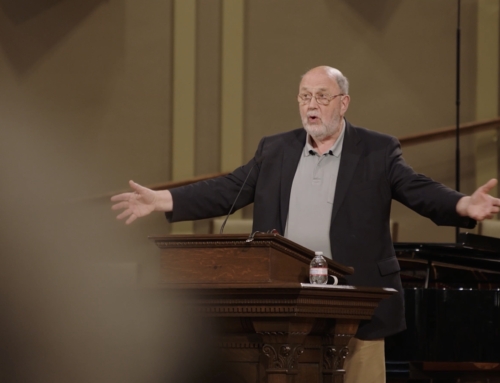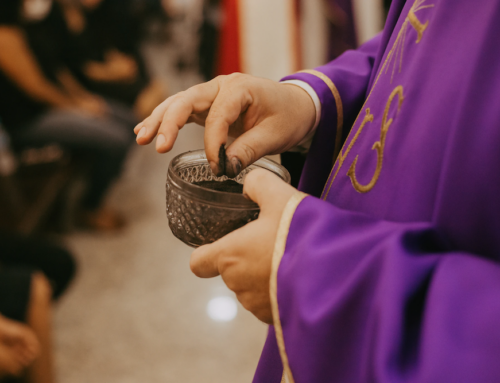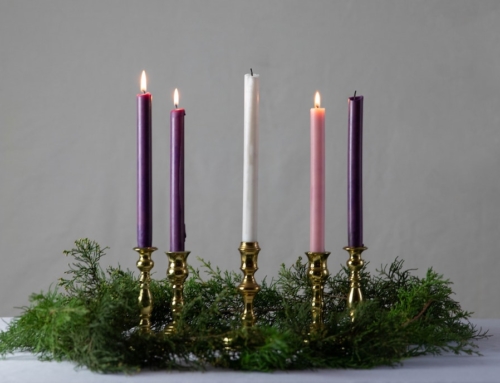By way of introduction, I am a student with Jennifer Loop at Durham University in England. We are both working towards Doctorates in Theology and Ministry although in very different subject areas, and I am nearly 30 years older than Jennifer!! Through Jennifer I have come to learn about N.T. Wright Online and the wider work of the Wisconsin Centre for Christian Studies and have been and continue to be pleased to support this work in different ways. I am an active member of my Church of England (Episcopalian) parish and serve in various different ministries.
Early Use of the Psalms in Worship
The use of the Psalms in worship as aids to prayer goes back to the early years of the Christian Church. By the fourth century when monasteries were being established, especially in the deserts of Egypt and Sinai, the psalms formed part of the daily rhythm of worship and were interspersed with formal prayer. Earlier hermits, like St. Antony, who lived in deserts made use of the psalms to help and support fellow Christians in prayer. Church historians refer to ‘The Desert Fathers’ and the important role they played in the development of worship and spirituality.
As similar religious communities were developed in Europe, for example by St. Benedict in the sixth century, the practice of ordered prayer became established as the monastic way of worship. There are seven services at various times of the day and night: these are lauds (dawn), prime (sunrise), terce (mid-morning), sext (midday), none (mid-afternoon), vespers (sunset), compline (retiring). Monasteries still follow this practice today as part of their Rule of Life. At that time, the normal language used in churches was Latin. Today, all the texts are accessible in other languages, including English.
The Development of the Book of Common Prayer
In England, as a result of his dispute with the Pope, King Henry the Eighth closed all the monasteries between 1536 and 1541, confiscated all their properties and assets and ordered that worship in church should take place in English. Thomas Cranmer, the Archbishop of Canterbury, devised a Prayer Book (the Book of Common Prayer), which was printed in English and—with some slight changes—is still used today. He combined the seven monastic services into two services: Morning Prayer and Evening Prayer. The Prayer Book sets out an order of reading the Psalms so that if a person attends worship services or reads Morning and Evening Prayer every day for a month, s/he will have heard or read every one of the 150 psalms.
Church of England clergy say Morning and Evening Prayer in their churches daily, which may be accompanied by the ringing of the church bell to demonstrate audibly that it is happening. This still occurs today, especially in large churches like Cathedrals while other clergy may opt for a more personal ‘quiet time’ in their clergy houses.
Using the Psalms in Liturgy
In the Church of England (CofE), many like myself find that structured liturgical worship is a foundation of worship and discipleship. I know that there are criticisms about the perceived lack of freedom for the Holy Spirit within this framework, but it is a constant pattern that offers continuity and brings comfort. The Book of Common Prayer also guides readers through difficult Psalms, which enables the reader to empathise with injustice, indignation, and to pray with and for outraged, grieved, or troubled souls. The Psalms can become ‘something other’ that breaks in to challenge our often comfortable lives with the realities others may be experiencing. This is just one way that the Psalms help to unite us in Word and worship together, no matter where we are gathered.
The Psalms are the supreme place where the prayers and songs of God’s people are to be found in the Bible. What is useful about praying the psalms with Morning and Evening prayer services using the Book of Common prayer is that it enables the regular reading of the Psalms, many of which give voice to our own personal situations, or those to whom we minister. The CofE Daily Office app (free to download) is easy to use and offers a modern version or the traditional prayer book form. It is a key part of my daily devotions as I find it gives structure both to my prayer life as well as my daily devotional reading of scripture, as it includes two readings—one from an Old Testament book and one from the New Testament. Many are also encouraged by knowing that they are sharing in prayer with many thousands of other Christians across the world. This can be helpful especially to those who are personally isolated for various reasons.
The streamed service from Durham Cathedral of Morning Prayer includes worshippers from Mongolia to Maryland, from Sweden to Scotland and many places in between. I join this live stream of Morning Prayer most days and ‘meet’ Christians from across the world including from Wisconsin (in spite of it being around 2:30 am!). The service is recorded so that people can access it at a more convenient time based on particular time zones. I also try to access Evening Prayer online on as many days as possible. Very often this service is sung by the Cathedral Choir, which and gives an added dimension to my meditations (although I recognise that for some, this form of worship is not helpful). Most evenings, before I go to bed, I use the monastic service of Compline (in modern English) with its use of Psalms, some whole or just different verses (again on the website or app). I find that it is a way of ‘winding down’ as well as of giving me an opportunity for a spiritual reflection of the day that is past, its joys, its challenges and its sorrows. It contains a space to pray for those people and concerns that are on my personal prayer list and that I find to be extremely valuable.
I value this structure because my time of prayer is not compromised by my mood, and so often, I find something new in Psalms I had thought were familiar verses. For those of you who want to experience this, Durham Cathedral has started to stream this service at 845pm (UK time) every Monday. Again it is recorded and is available on the Cathedral Facebook page so that you can use it as fits your time zone.
Different Types of Prayer Found in the Psalms
There are so many types of prayer which can be encountered in the Psalms and they address the whole range of our normal human emotions. It is important that we do not censor the Psalms. There are some very difficult verses which challenge our understanding of God and challenge us to understand (Psalm 137 verse 9 is a case in point). As mentioned earlier, the Prayer Book divides them according to the days of the month so there is a structured reading plan already in place for you to follow
Here are just a few examples and I would encourage you to read them for yourselves as you read this blog so that you can understand what I mean.
We can join in praise (Psalms 145 and 150), we can claim confidence in God’s care and support (Psalms 23 and 121), we can confess our sin and receive the assurance of God’s forgiveness (Psalm 51) and we can rage in God’s presence about injustice and personal distress (Psalm 55) as well as praying for his protection in specific circumstances (Psalm 59). Above all, as we read these Psalms, we are drawn into the presence of God.
The Presbyterian minister and prominent evangelist, Archie Parrish, who died in October 2019, wrote these words which are particularly relevant to the Psalms:
‘The will of God is revealed as you listen to the Spirit of God in the Word of God. The precepts and promises of the Bible teach us what to pray. They teach us what grace to ask for and for what work we need strength. On every page of the Bible there is subject matter for prayer’.
Bishop Westcott, the renowned nineteenth-century theologian and Bishop of Durham (England) observed: ‘One way to pray more effectively is to echo God’s Word back to Him as you pray. We align our hearts with His heart as we pray His Words from our hearts’.
Professor Wright’s new course on the Psalms is a great way to begin to understand the Psalms more deeply both in the context in which they were written but also more importantly how they can be applied to our daily lives as Christians, so that, instead of just being poems written several thousand years ago, they become the living words that God speaks to us and, in which, we in turn can speak back to God. I gained many new insights when I was given the opportunity to preview the course. I pray that you will be blessed as you engage with the Psalms and find enrichment support, comfort and challenge as you seek to serve and witness to God in your daily lives.
administrator
Latest posts by administrator (see all)
- Psalms: Aiding Christian Worship for Over a Millennium - August 14, 2021
- Heritage - October 2, 2020
- Simply Jesus Small Group Giveaway - September 15, 2020







